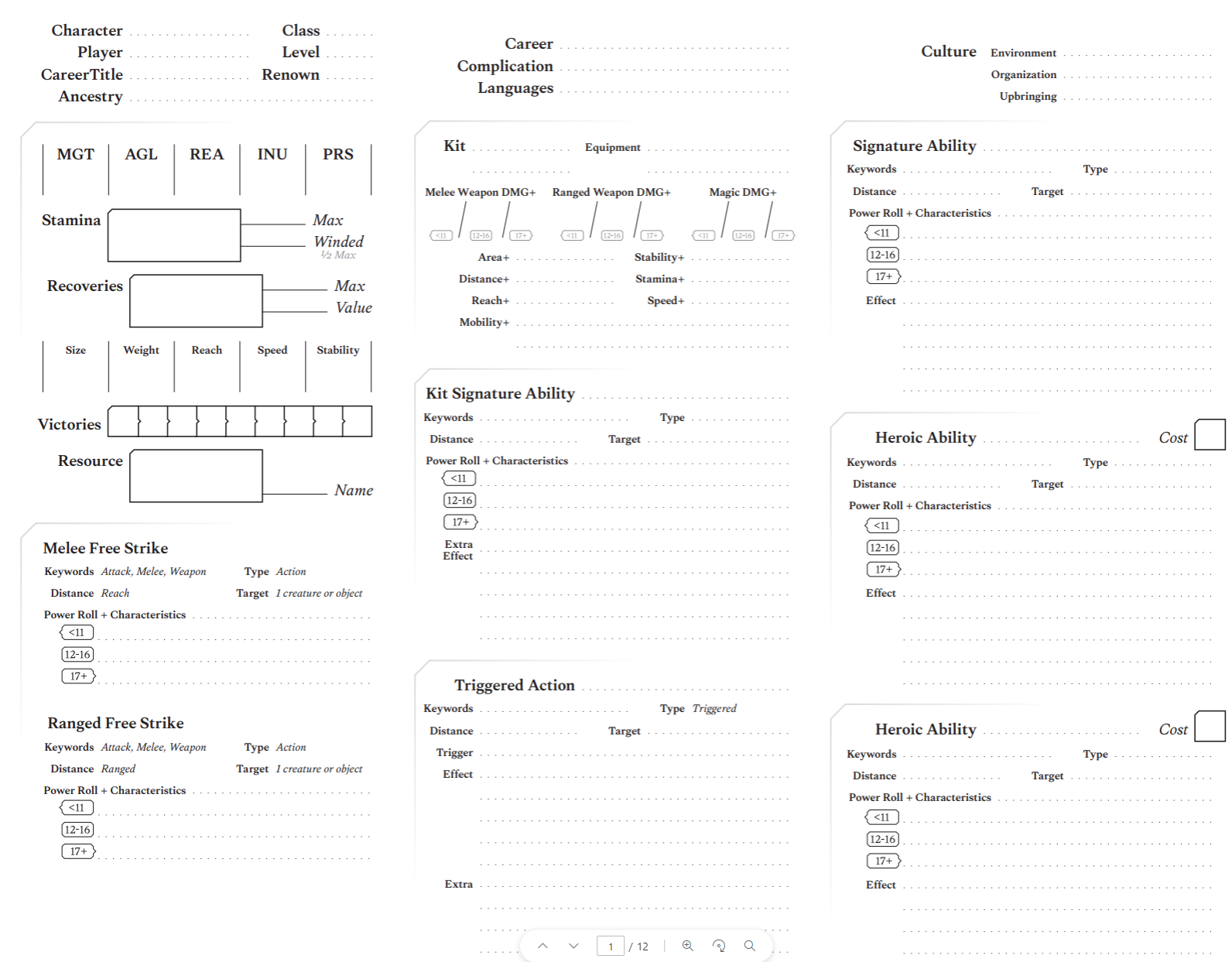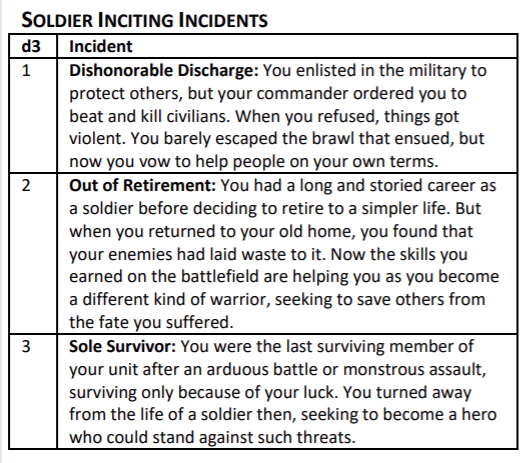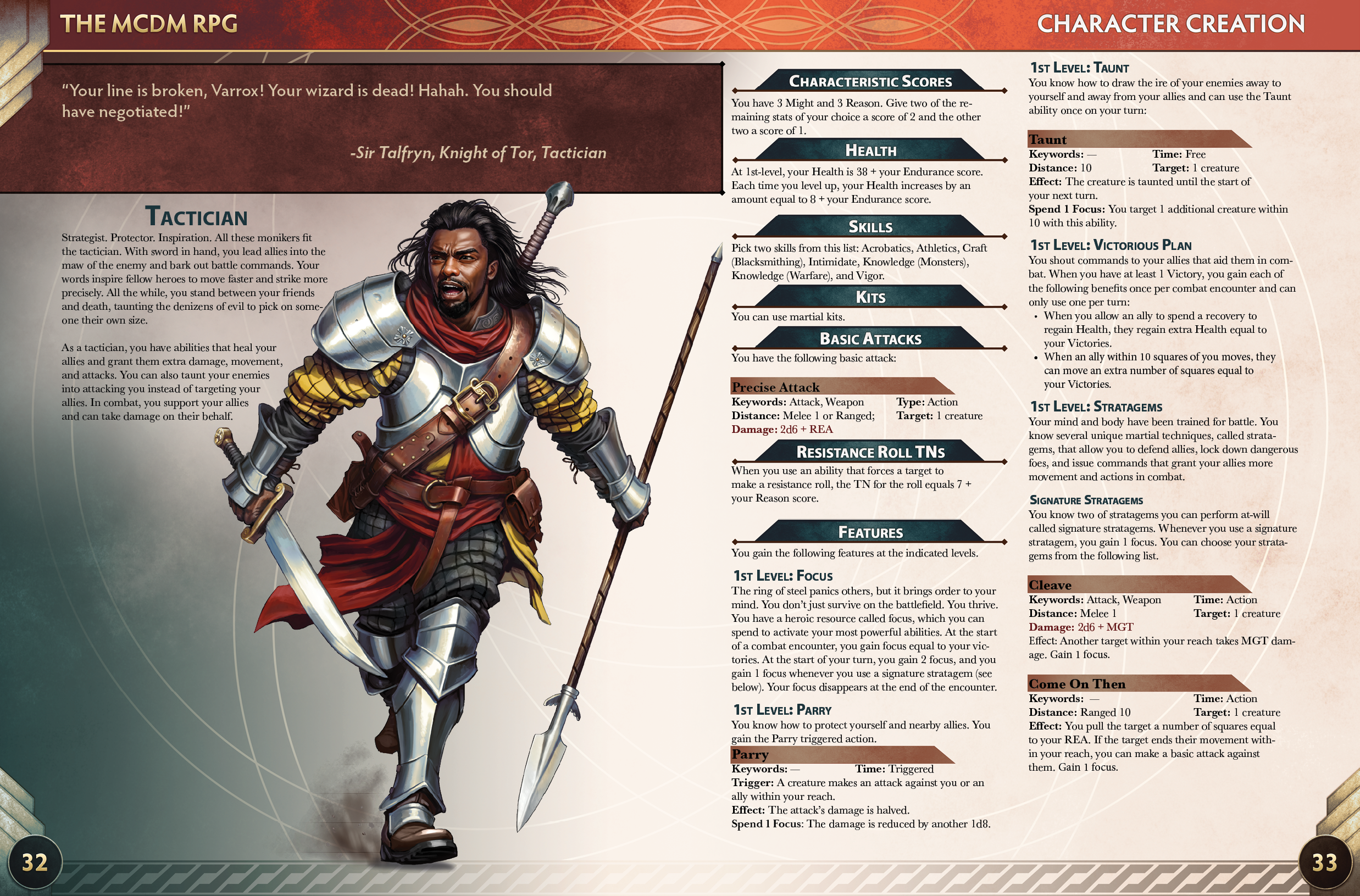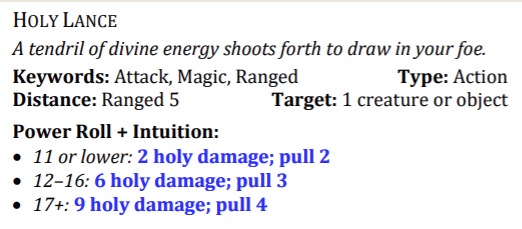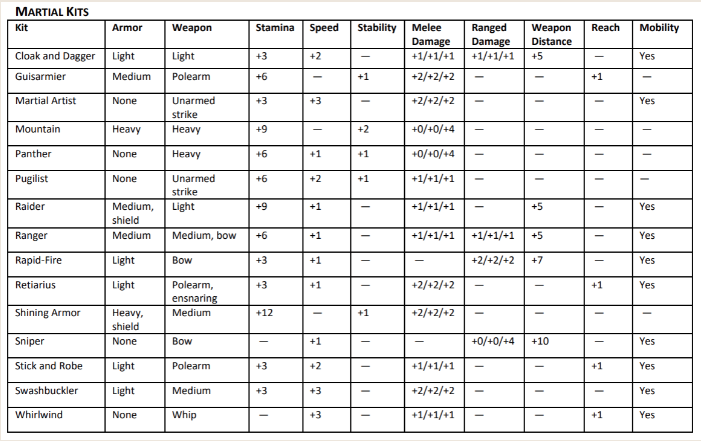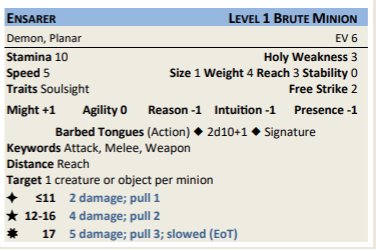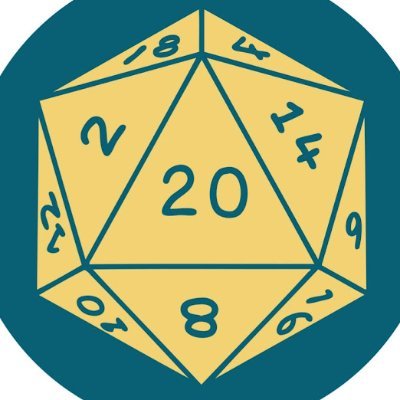


Overview
This is the TTRPG from Matt Colville and the MCDM crew. Its touted as **Heroic, Tactical, Cinematic,** and **Fantasy**. Its very much a tactical miniatures game, and it has a lot of wonderful concepts that draw from war gaming and board gaming. Currently this write up is for the Beta version, since the actual release is still a year away.
- Tactical
- This game is very tactical. Lots of decisions and mechanics play off of each other, so understand your abilities is crucial
- Mechanical
- Similar to board games, each class will have a different feel and mechanics to illustrate that feel and vibe
- Heroic
- You will definitely feel powerful unleashing a lot of the combos and powers of this game

Resolution Mechanic
The main resolution system uses 2d10, referred to as Power Rolls. These Power Rolls are tiered into three results: 2-11, 12-16, and 17+. In certain situations, the tier numbers might vary. Regardless of the outcome, you can choose to take a lower tier result if it's more favorable for that situation (downgrading a Power Roll).
Power Rolls come in three types: Ability Rolls, Resistance Rolls, and Tests. Ability Rolls are used to activate abilities, Resistance Rolls are for defense, and Tests involve interacting with the environment or world.
You add your Characteristic or Ability modifier to the roll’s result. A natural 20 (rolling a 10 on both dice) always counts as a tier 3 result, even if you have a negative modifier.
For Test Results, charts are provided to determine whether a Test results in failure, success, success with consequences, or failure with consequences. Each tier result depends on the difficulty of the test:
- Easy Test tier 1 = failure
- Medium Test tier 1 = failure with consequences
- Easy Test tier 3 = success with a reward
- Medium Test tier 3 = success
These rules apply only to Tests, not Ability Rolls.
In some situations, you may also roll a d6 or a d3.
Always round down in this game.
Character Design
Ancestry/Race/Kin
Devil Dragon Knight Dwarf Elf (High) Elf (Wode) Hakaan Human Memonek Orc Polder Revenant Time RaiderThe Ancestries include a wide variety of options: Devil, Dragon Knight, Dwarf, Elf (Wode), Elf (High), Hakaan, Human, Memonek, Orc, Polder, Revenant, and Time Raider.
Each Ancestry is richly detailed with a narrative background to provide context on their characteristics and culture. This is followed by the specific benefits associated with that Ancestry.
The variety of bonuses your Ancestry offers as a player is diverse, including special abilities, equipment, or stat bonuses:
- Humans gain extra recoveries and increased resistance to magic and psionics.
- Devils can spend points to customize their appearance, with each feature granting a unique bonus.
- Orcs receive thematic combat actions.
- And so on.
Attributes
Agility Might Presence SpeedYour Attributes (or Characteristics) range from -5 to +5, acting as modifiers that are added to your Power Rolls. The attributes include:
- Might
- Agility
- Reason
- Intuition
- Presence
Skills
This game offers a wide variety of skills, but they are organized into distinct Skill Groups: Crafting, Exploration, Interpersonal, Intrigue, Lore. This way, when you gain a new skill from your Background or Class, it will specify "you gain a new Intrigue Skill," allowing you to choose the specific skill you want from that group.
Background
Culture
Next, you round out your character by selecting a Culture, which represents where you grew up. This consists of three elements: Environment, Organization, and Upbringing.
- Environment: Rural, Nomadic, Secluded, Urban, Wilderness, Anarchic, Bureaucratic
- Organization: Anarchic, Bureaucratic, Communal
- Upbringing: Academic, Creative, Illegal, Labor, Martial, Noble
Each choice provides different Skill options. Skills are organized into groups, and your selections here determine which Skill Groups you can choose from.
Career
Your Career defines your profession or training before becoming an adventurer. It grants additional Skills, Languages, and a Renown Score. Additionally, your Career may allow you to engage in crafting and research later on.
- Artisan, Criminal, Gladiator, Laborer, Mage’s Apprentice, Performer, Sage, Soldier
Each Career also includes a table of potential inciting incidents, detailing the events that led you from that Career to the life you now lead.
Complications
If you choose to, you can also take on Complications. These are thematic ties that add depth to your character, such as being a Cult Victim, having a Punishment Curse, or suffering from Primordial Sickness. While these provide small bonuses, they also come with drawbacks.
Class / Profession
Beastheart Censor Conduit Elementalist Fury Mage Null Operator Shadow Summoner Tactician Talent TroubadourThe current playtest features a few classes: Conduit, Fury, Tactician, Elementalist, and Shadow.
Abilities/Power/Feats
Each Class offers a wide range of abilities, which is one of the standout features of the game. There’s a great deal of flexibility and strategy involved in how you choose to run your class. Since this is very much a Tactical miniatures game, you'll need to be prepared to manage your resources effectively.
Equipment / Gear
Kits
The approach to equipment, gear, and combat style in this game is quite unique. Kits are divided into Martial Kits and Caster Kits, each representing different archetypes commonly found in fantasy settings.
- Cloak & Dagger
- Martial Artist
- Ranger
- Mountain – durable brute
- Sniper
- Whirlwind
- Missile (caster)
- Nature Calling (caster)
In total, there are 22 Kits currently available in the playtest. These Kits will strongly influence how you approach gameplay and shape your overall playstyle.
These Kits determine various bonuses such as attack power, health, speed, stability, reach, and mobility. The increase in Stamina is their design's approach to represent increased armor. Since traditional armor typically reduces damage in games, this system simplifies it by boosting your health instead, offering a more straightforward way to handle durability and protection.
Advancement
Each Encounter rewards you with Victories. Refer to the Action Pools section to understand their function. When you take a Respite or a long rest, you can exchange these Victories like Experience points to gain levels in your class or profession. This unlocks new abilities or powers.
Combat
Initiative
Alternating Side InitiativeFirst, you determine if either side (or anyone) is surprised. Surprised individuals:
- Cannot make triggered actions or free trigger actions.
- Suffer edges against them for attacks and damaging area powers.
- Receive banes on resistance rolls.
If no one is surprised, initiative is determined by rolling a d10. A result of 6 or higher means the heroes go first. Then, you enter Alternating Side Initiative. After a hero takes their turn, the GM selects a monster to act. This alternation continues back and forth. If one side runs out of characters, the other side simply finishes off their remaining members.
Enemies operate slightly differently. For example, the GM activates all Minions in a Squad simultaneously. Additionally, the GM organizes monsters into Groups for an encounter, allowing all members of a Group to act together.
Turns / Rounds
Once all players and monsters have taken their turn it is a single round.
Action Economy
On a turn, a creature can perform a Move, a Maneuver, and an Action. You can break up your Movement around your Maneuver and Action as well.
You will also receive one Triggered Action per round, which functions similarly to a Reaction. Your character may have access to multiple Triggered Actions, so you'll need to choose wisely when to use this.
Movement
Movement corresponds to your speed, indicating the number of squares you can travel. You can choose to Shift, which allows you to move half your Speed without provoking Opportunity Attacks from enemies.
Maneuvers
Maneuvers are quick actions you might want to attempt that aren’t necessarily free to do, but would feel frustrating if they consumed your entire Action. Examples include:
- Aid
- Drink Potion
- Escape Grab
- Grab
- Hide
- Knockback
- Search
- Make/Assist Test
- Stand Up
Actions
Your Action will primarily consist of attacks, but you can also choose to do other things, such as:
- Catch Breath (use a Recovery)
- Charge
- Defend (grant a double bane to attacks against you)
- Free Strike
- Heal
Attack Mechanic
Typically this is an ability Power Roll.
- 2d10 + Characteristic/Attribute + Edge/Bane
Result will be listed on the Abilities table.
Defensive Mechanic
Monsters will utilize Power Rolls to deal damage to your Stamina accordingly. You may have Triggers or abilities that can help reduce incoming damage.
Monsters come in various types, similar to those in 4th Edition D&D. These include Brutes, Artillery, Minions, Harriers, Hexers, Controllers, Ambushers, and more.
Reaction Rolls
These are similar to saving throws. Hidden monsters, motives, or environmental features may need to make Reaction Rolls. The effects of these rolls can vary significantly.
Modifications to Resolution
Edges/BanesEdges & Banes
In addition to Characteristics and other Ability bonuses and penalties, there are also Edges and Banes.
A single Edge provides a +2 bonus to any Power Roll. A double Edge automatically increases the Tier result, regardless of your roll. Conversely, Banes impose a -2 penalty and decrease the Tier result.
When you have both Edges and Banes, they counteract each other. If you have one of each, they cancel each other out. No matter how many Edges or Banes you accumulate, the maximum effect is capped at double. For example, having three Edges is simply referred to as a double. If you have a double Edge and a single Bane, it results in a single Edge.
- 5 Edges + 1 Bane = single Edge
- 1 Bane + 1 Edge = nothing
- 5 Edges + 2 Banes = double Edge + double Bane = nothing
Assist a Test
If you assist with a test, you will roll a Test and either grant your ally a bane, edge, or double edge to their test.
Resource Management
Rest Mechanic
Resting in Draw Steel is referred to as a Respite. To take a Respite, you must have 24 hours of uninterrupted time.
Resource
Heroic Resources - Metacurrency for Classes
These resources are highly variable, reflecting the unique mechanics and themes of each class. Some classes build a positive resource as they utilize powers, while others accumulate a negative resource. The rate at which these resources accumulate can differ significantly—some classes may build their resources more slowly, while others do so more quickly. The design team at MCDM has focused on creating a specific vibe and feel for each class, ensuring that the resources reflect that essence.
For example, the Tactician uses Focus, while the Conduit uses Piety.
Victories
Victories serve as a power balance within the game. They are not strictly an action pool but function similarly by tracking your success across encounters. As you lose hit points and resources during consecutive encounters, your character naturally becomes weaker or has less potential.
Victories increase when you successfully complete encounters, whether they involve combat or non-combat challenges. As your Victories accumulate, you unlock new class-specific bonuses that can be quite beneficial, adding a press your luck element to the game. You’ll face the decision of whether to continue pushing forward to gain more Victories while managing dwindling resources.
Importantly, Victories are banked and can be converted into Experience when you take a Respite (a longer rest). This system encourages strategic planning and risk assessment throughout your adventures.
Health & Dying
Stamina and Health Mechanics
Stamina serves as the primary measure of health in this game, akin to Hit Points in other systems. When your Stamina reaches 0, your character falls unconscious.
Recoveries
You have a specific number of Recoveries, each tied to a Recovery Value. Whenever you take damage between rests, you must spend one of your Recoveries to regain Stamina equal to your Recovery Value. This mechanic is reminiscent of the Hit Dice system from 4E D&D. Additionally, various powers or actions may allow you or your allies to spend a Recovery.
You regain your Recoveries after completing a Respite (long rest).
Hope Tokens
Hope Tokens provide an additional layer of healing options. When you possess a Hope token, you can spend it on your turn or immediately after taking damage to recover an amount of Stamina equal to your Recovery Value. This acts similarly to inspiration tokens, but specifically for health recovery.
Winded & Dying
Your Winded value is set at half your total Stamina. This value may trigger other effects, particularly for abilities or attacks against you.
When your Stamina hits 0, you enter a dying state. While in this state, you can continue to fight, but if your Stamina drops into the negative equal to your Winded value, your character dies.
While dying, any attack you make, test of Might or Agility, or any triggered action, costs you 1d6 Stamina. Additionally, you cannot use the Catch your Breath action while dying, although your allies may be able to assist you.
GM Guide
The game also contains a TON of other features, and rules explanations. Here are a list of other things you'd find in the current game.
- Group Tests
- Montage Tests
- Hide & Seek
- Renown
- Followers
- Wealth
- Flanking
- Concealment
- Cover
- Negotiation
- Mounted Combat
Character Sheet
